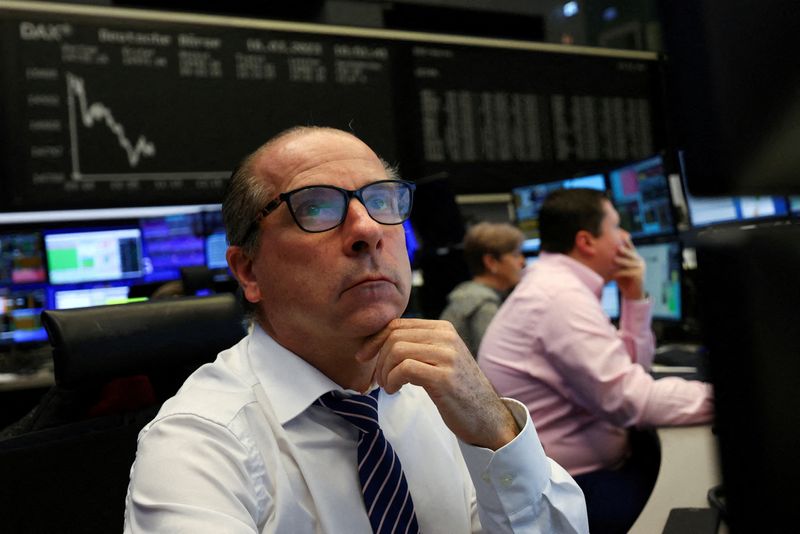(Corrects typo in paragraph 28, commercial not commerical)
By Marc Jones
LONDON (Reuters) - From a red-hot January as China cast off COVID curbs to February's flop when interest rates surged and now a manic March of banking blow-ups - financial markets have had an action-packed start to the year even by recent standards.
Totting up the first quarter scores shows world stocks with a healthy 6% gain, government bonds up 3%-5%, gold 8% higher, energy prices sliding and the dollar barely budged.
Dig deeper though and the volatility soon emerges.
Global shares zoomed up 10% in January only to lose it all by the time Silicon Valley Bank, a mid-sized U.S. lender few had even heard of, collapsed and then the 167-year-old Swiss behemoth Credit Suisse required rescuing.
Equities are bouncing though now and U.S. and European government bond yields - the main drivers of global borrowing costs - are set for their biggest monthly drop since the global crash of 2008.
"Within three months you have had three completely different stories," BofA analyst, David Hauner, said of the year so far.
"January was an extremely strong start with China's reopening, but February we were back to pricing 6% Fed interest rates and the next thing has been the problems in the banking system."
Graphic: Shaky start, https://www.reuters.com/graphics/GLOBAL-MARKETS/Q1/byvrlmakrve/chart.gif
A key reason why asset prices have swung around so much is that market makers are unsure how big central banks will react now. Push on with rate hikes and tempt further banking sector troubles? Or press pause and risk more inflation?
Two-year Treasury yields, which are highly sensitive to U.S. Federal Reserve moves, jumped from 4% to 5% in February, only to dive back to 3.5% when the SVB turmoil redrew the entire U.S. interest rate map.
That hoisted U.S. bond volatility to its highest point since the 2008 meltdown. Europe too saw 2-year German yields arc from 2.5% to almost 3.5% and back, while changes at Japan's central bank have also been moving the dial.
'Big Tech' stocks crave low borrowing costs so they have roared up by a third. The Nasdaq is up 18%, China tech 22%, emerging market countries have sold record amounts of debt and commodity markets see recessions coming.
"All the action has been in the bond markets," said SEB Investment Management's global head of asset allocation Hans Peterson, explaining the shifts had been hard to navigate. "The equity market has done impressively well considering."
COCO POP
The dollar's 1% dip is its weakest start to a year since 2018 and allowed Britain's pound and the euro to climb around 1.5%.
Worldwide, Chile, Mexico, Hungary and Colombia's currencies have jumped the most - as much as 8% in Chile's case as its main export, copper, has also risen 7% as resource-hungry China has reopened and rebooted.
Top of stocks in national terms is the Czech Republic with a 30% rise in dollar terms. Colombia is down 16% at the other end of the spectrum and India is down 8% having seen one of its biggest conglomerates, Adani, skewed by short sellers.
Graphic: Currencies vs the US dollar, https://fingfx.thomsonreuters.com/gfx/mkt/zdpxdqbjqpx/Pasted%20image%201680189106313.png
Bitcoin beats the lot having surged 70%, including 40% in just 10 days during this month's SVB and Credit Suisse chaos.
Banking sector woes have been kryptonite for financial stocks, however, as well as the risky breed of 'contingent convertible' (CoCo) bank bonds wiped out during Credit Suisse's rescue.
The scare factor was that the bank's shareholders got some of their money back, which turned the normal hierarchy of bondholders before shareholders on its head and shattered trust in the specific 'AT1' type of CoCos that went pop.
Other European banking authorities were so spooked they gave reassurances that they wouldn't do the same. CoCo debt is still down 15% however and insuring against a bank default now costs a lot more.
"For the banks it was the most nervous situation we have seen for a while," SEB's Peterson said.
Graphic: 2023 asset performance, https://www.reuters.com/graphics/GLOBAL-MARKETS/Q1/lbvggjaomvq/2023-asset-performance.jpg
DIRECTIONLESS
A 42% drop in Europe's natural gas prices, a 9% fall in oil and 12% and 4% respective tumbles in wheat and corn have fed hopes of lower inflation despite the unrelenting war between producers Russia and Ukraine.
Since late 2021, big developed economies including the United States, Europe and Australia have raised interest rates by almost 3,300 basis points collectively. So whether that surge halts this year remains pivotal for investors.
It is crucial for many of the heavily-indebted developing world countries. Ghana has joined a record number of sovereigns in default this year and concerns are growing elsewhere too, including in U.S. commercial real estate markets.
"A lot of people have been looking for direction where there hasn't really been any," Willem Sels, Global Chief Investment Officer at HSBC's Private Banking and Wealth arm said of the flip-flopping in both equity and bond prices.

"It could well be that we are in a directionless but volatile market for the next quarter or two," he said, pinning Q3 or Q4 as the best hope for a sustained pick-up.
(This story has been refiled to correct a typo in paragraph 28)